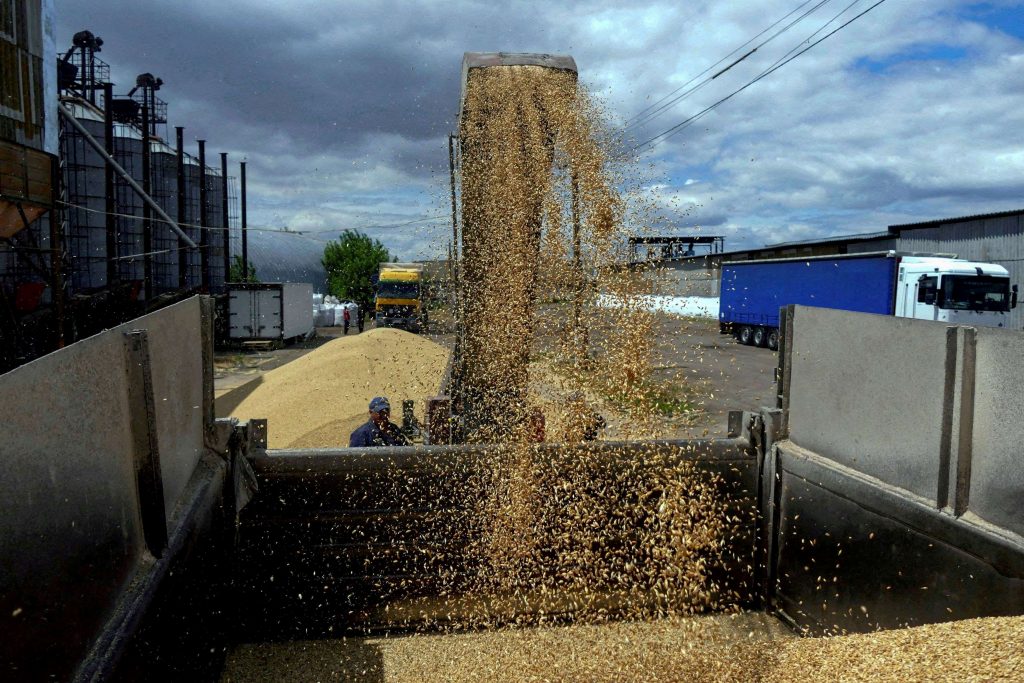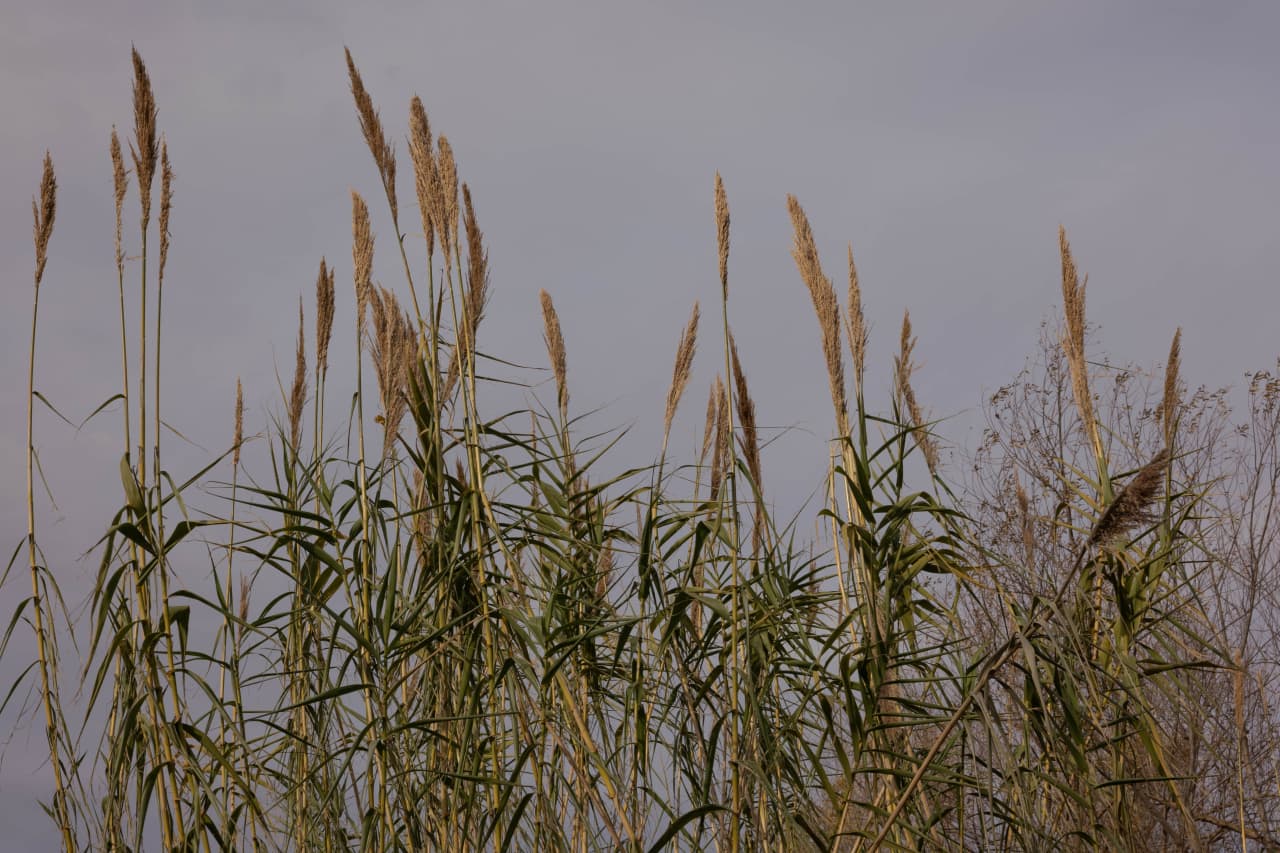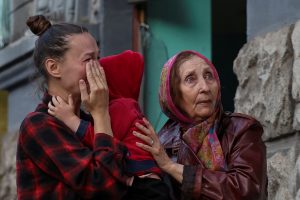KYIV, Ukraine—Beyond the bombs and gunfire of Russia’s war in Ukraine , a parallel economic war is raging.
Its front line is on occupied Ukrainian farmlands, from which Russia and its partners have sold almost $1 billion in stolen grain on a burgeoning black market.
Moscow’s forces in Ukraine since 2022 have occupied some of Europe’s most fertile farmland. The occupiers have either seized harvests or bought them cheaply, often forcibly.
The business involves a wide network of clients who benefit from Moscow’s wartime patronage system, including a Russian shipyard equipping the invasion, a company affiliated with Iran’s Revolutionary Guard and a Crimean businessman who trades with Syria and Israel. Another company sells through the United Arab Emirates.
Trading the looted Ukrainian agricultural products keeps Russia’s allies funded and loyal to Moscow even as it faces mounting economic pressure , offering a sort of off-balance-sheet vehicle financing Kremlin objectives.
The Kremlin didn’t return requests for comment on its exports of Ukrainian crops.
“It’s like the war is feeding itself,” said Pascal Turlan, legal director at rights organization Project Expedite Justice, which is helping Ukrainian prosecutors investigate grain theft. “The illicit trade brings revenue to a Kremlin-sponsored patronage system, which in turn helps the conflict and the occupation to continue.”
The exact commercial value of Russia’s pilferage is difficult to determine amid the war’s chaos and Moscow’s subterfuge, but it is large. Since 2022, the operation has directly shipped at least 4 million tons of grain and other produce from occupied Ukraine to international markets, generating revenue of $800 million, said Markiyan Dmytrasevych, Ukraine’s deputy agriculture minister.
Much more has been exported by land or small ships, according to Ukrainian nonprofit organization Texty, which estimates the total value of grain taken by Russia in occupied territories could be as high as $6.4 billion.
The patronage takes many forms. Three bulk vessels that export large volumes of illicit grain are owned through a chain of corporate entities by Russia’s state-run United Shipbuilding Corp., which also produced warships used to shell Ukrainian cities, according to the U.S. government.
A Russian company that exclusively sold grain from the occupied region of Zaporizhzhia donated 10 million rubles, equivalent to $111,000, to a battalion fighting in the province, according to a document obtained by KibOrg News, a Ukrainian project that documents Russian economic-looting activities in the occupied territories.
Moscow is also attacking Ukraine’s own grain exports. Late Wednesday, a Russian missile struck at a ship that was carrying Ukrainian wheat just after it had left a Black Sea port for Egypt, Ukrainian President Volodymyr Zelensky said on his Telegram channel.
From farm to sea
Russia’s illicit agricultural trade begins on Ukrainian farms. Moscow’s forces either compel farmers to sell their crops at below-market prices or steal them, sometimes at gunpoint.
Bohdan Katerenyak, the manager of a silo in Kherson, a southern Ukrainian region conquered by Russia at the beginning of the war, said he was at work in August 2022 when men with machine guns, clad in balaclavas, entered his office.
“We have an order to take over,” one told him in a Chechen accent, handing him an identification card from the FSB, Russia’s domestic security service, Katerenyak said. A few days later, another man, also claiming to be an FSB agent, arrived and impounded the facility’s grain.
“They are bandits,” Katerenyak said of the men. Fearful, he fled to Ukrainian-controlled territory and later learned the silos had been emptied.
From farms like Katerenyak’s, produce is shipped by truck and rail to ports along the Black Sea, some on occupied Ukrainian territory.

Russian authorities say that in the first half of this year, they sent 15 ships carrying 81,000 tons of wheat to Turkey from Mariupol, another city conquered during the war.
Turkey bans ships from occupied Ukrainian terminals and cooperates with Kyiv to block illicit trade, the country’s foreign-affairs officials said.
Separately, Ukrainian prosecutor Ihor Ponochovniy in June started tracking a Turkish-owned ship, the Usko MFU, which he suspected had carried stolen grain last year from the Crimean port of Sevastopol . Russia seized Crimea from Ukraine in 2014 and in 2022 linked it with occupied Kherson.
Ukraine’s border force in June told Ponochovniy the Usko MFU had entered Ukrainian waters. The prosecutor, who works closely with the Security Service of Ukraine, issued a search warrant and police boarded it. Onboard they found records showing it had left Sevastopol last November for Turkey carrying 2,100 tons of crushed sunflower seeds and brown wheat potentially worth half a million dollars.
Investigators said they found onboard a message from the ship’s managers to the captain instructing him to conceal the cargo’s Crimean origin. Ukraine’s border force in July seized the Usko MFU.
The ship’s owner, USKO Shipping Management, didn’t respond to a request for comment. A lawyer representing the vessel’s captain declined to comment.
Mikhail Ganaga, a former professional wrestler and the son of a district governor in Crimea, is among a select group of collaborators who have profited from the grain theft.
Ganaga controls Agro-Fregat LLC, which delivers grain harvested in occupied territories and has shipped grain to Israel and two of its foes, Syria and Iran, according to trade and shipping records and Ganaga himself. Ganaga and Agro-Fregat didn’t return requests for comment.
Pressure to halt shipments
Ukraine is applying diplomatic pressure on importing countries, with some success. In the past two years, Egypt, Israel and Lebanon either canceled loadings or stopped buying grain cargoes after Ukrainian diplomats told them they had departed from Russian-occupied parts of Ukraine , according to Ukrainian officials.
Foreign Ministry spokesman Heorhiy Tykhiy said Lebanon shifted to Ukrainian grain. Egypt has refused some grain shipments that originated in Russian-occupied territories of Ukraine, according to Ukraine’s military intelligence agency.
Russian allies Iran and Syria have said they won’t abide by sanctions. Iran has supplied the Kremlin with deadly weaponry that enhanced Russia’s ability to hit military and civilian targets. This month, Tehran started to supply ballistic missiles to the Kremlin. Iranian politicians said they were in exchange for Russian grain. Tehran denies transferring weapons to other countries.
Tehran buys barley in Crimea for $140 a ton, a 34% discount from market prices, said Kateryna Yaresko, an analyst at SeaKrime, a nonprofit project in Kyiv that tracks illegal shipments from Crimea and provides information to the Ukrainian authorities.
Traders in Russian-occupied territories are building ties with Tehran’s hard-line circles. Igor Rudetsky, a manager at a grain terminal in occupied Crimea, last year posted on his social-media accounts pictures of himself meeting representatives of Islamic Republic of Iran Shipping Lines, which is sanctioned by the U.S. for shipping weapons on behalf of Iran’s military and nuclear technologies.
Rudetsky, according to his posts, also visited Pars Holding, an agricultural company that is part of a foundation controlled by Iranian Supreme Leader Ali Khamenei . Rudetsky said by text message that he spoke to the companies as part of an international marketing campaign that also included China, India and Africa, though he said he doesn’t sell produce himself.
Rudetsky said that grain exports from Russia aren’t restricted by international sanctions and that he bought the port “for real money” in a deal that was “legally impeccable.”
Russia deems Crimea its territory but other countries don’t and consider any exports from it illegal.
Yemen is a new market for Crimean exports. In June, a Russian state-controlled vessel, the Zafar, delivered grains to al-Salif, a port held by the Iranian-backed Houthi faction in Yemen, according to shipping and corporate records.
As Kyiv cracks down, exporters are adopting increasingly complex evasion tactics such as transferring grain to Russia and mixing it with legitimate products before reselling it on international markets. Ukrainian authorities are struggling to keep up.
“We need more people,” said Ponochovniy, the prosecutor.
Ukrainian prosecutors in Kharkiv are probing a trader that it suspects stole grain and resold cargoes to an Emirati company. Helios Plus drew prosecutors’ attention after it removed all 700 tons of grain left at a bread-factory flour mill in the nearby town of Kupyansk when Russia seized it in August 2022.
Helios Plus didn’t respond to a request for comment.
The company in 2015 started selling grain out of areas of eastern Ukraine that had come under control of Russian-backed separatists, according to Russian records viewed by The Wall Street Journal. The records were obtained in an investigation by Project Expedite Justice.
The documents indicate Helios Plus took a large volume of grain from other occupied territories in the past two years. It then sold grain to buyers in Turkey, the U.A.E. and as far as Costa Rica, according to customs declarations.
Write to Benoit Faucon at benoit.faucon@wsj.com










